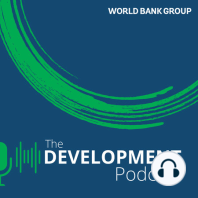33 min listen

Why Have Smaller States Been Hit So Hard by Economic Shocks?
Why Have Smaller States Been Hit So Hard by Economic Shocks?
ratings:
Length:
19 minutes
Released:
Feb 3, 2023
Format:
Podcast episode
Description
The recently released January edition of this year’s Global Economic Prospects report warns that the global economy is dangerously close to a recession, with worldwide economic output projected to be just 1.7% in 2023. While the outlook for all economies is quite grim, the edition takes a special focus on the plight of 37 small states—countries with a population of 1.5 million or less—that are already vulnerable to shocks stemming from the pandemic, climate change, disruptions to tourism and more.In this episode of The Development Podcast, we speak with three guests: Dana Vorisek, senior economist and one of the lead report authors of the Global Economic Prospects report; the Hon. Tiofilusi Tiueti, Minister for Finance and Tonga World Bank Governor; and Anna Kay, a female-owned restauranteur in Jamaica, who share their insights and experiences to the impacts of a worsening global economy on already vulnerable states. Tell us what you think of our podcast here. We would love to hear from you! Featured VoicesDana Vorisek, Senior Economist, World Bank Group. "The main reason small states were really hard hit by COVID was tourism. People were fearful of traveling, but also these countries shut their borders for a long time."Hon. Tiofilusi Tiueti, Minister for Finance and Tonga World Bank Governor. "The impact of climate change is obviously reflected on the frequency and intensity of a natural disaster, which further impacted our primary sector for economic development."Anna Kay, a female-owned restauranteur in Jamaica. "We can't get a lot of the things that we used to get, brands that we used to get before, or supplies that we used to get. The biggest thing is the cost of things."Timestamps[00:00] Welcome and introduction of the topic[01:29] Insights from the Global Economics Prospects Report[03:51] Visions from the Caribbean: The case of Jamaica[08:18] Visions from the Pacific: The case of Tonga[13:56] Characteristics, challenges and vulnerabilities of small states[18:44] Closing and thanks for tuning in!ABOUT THE DEVELOPMENT PODCASTThis international development podcast brings together the data, research—and solutions—that can pave the way to a sustainable future. Through conversations focused on revealing the latest data, the best research, and cutting-edge solutions, let us introduce you to the folks working to make the world a better place. Don't miss an episode! Listen and subscribe for free on your favorite platform. Tell us what you think of our podcast here.ABOUT THE WORLD BANK GROUPThe World Bank Group is one of the world’s largest sources of funding and knowledge for low-income countries. Its five institutions share a commitment to reducing poverty, increasing shared prosperity, and promoting sustainable development.
Released:
Feb 3, 2023
Format:
Podcast episode
Titles in the series (30)
'Absolutely Unacceptable' Vaccination Rates in Developing Countries by World Bank | The Development Podcast